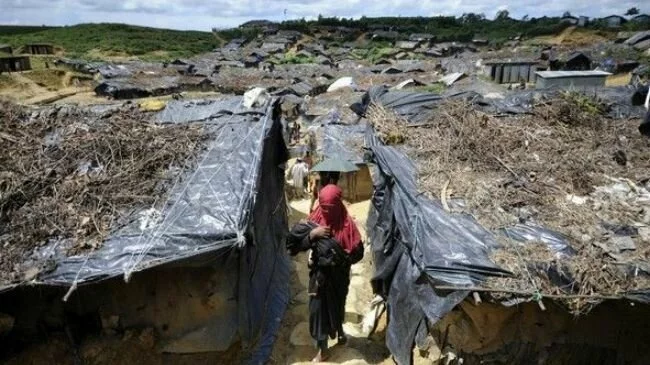 I am writing to every contact listed at Buddhanet.info’s American Buddhist Directory to ask:
I am writing to every contact listed at Buddhanet.info’s American Buddhist Directory to ask:
Are you aware of the ongoing genocide in Myanmar (Burma) — a genocide that is being committed in the name of Buddhism?
And did you know that the United States of America bears responsibility for this genocide, since the US has been rewarding the Myanmar regime with ever-closer political and economic ties during recent months of accelerating atrocities?
As American Buddhists, you are in a position to help stop this genocide, by pressuring the US and Myanmar governments as well as international human rights organizations. Your visible participation in the campaign to save the Rohingya people from extermination by murderous Buddhist fanatics will not only help draw the world’s attention to this horrific situation, but also help restore the image of Buddhism as a religion of compassion.
The facts about the genocide in Myanmar are not in dispute. The fanatical Buddhist nationalists, who unfortunately represent a large segment of the roughly 60 million Buddhists in Myanmar, admit that they are trying to uproot and exterminate the roughly one million Muslim Rohingya from land that the Rohingya have lived on for centuries.
Here is what a typical genocidal Buddhist fanatic from Myanmar wrote in a comment on a Wall Street Journal article:
“Burma is Buddhist nation created for the 135 Tibeto-Burman tribes. People do not get citizenship just because born there or illegally lived there for centuries. Please do not interfere with the law and internal affairs of Burma just as you do not like other nations to poke their nose in your internal affairs.”
“People do not get citizenship just because born there or illegally lived there for centuries.” This statement, which aptly sums up the official policy of the Burmese regime, could get the person who made it, and the government that follows it, hanged for crimes against humanity. Obviously, being born in a modern nation to a family that has been there for centuries automatically confers citizenship. And obviously, any modern nation that denies citizenship to such people, burns their homes and communities, and murders them en masse, with the aim of removing them from the nation of their birth, is committing the internationally-recognized crime of genocide.
In recent weeks, many thousands of homes, and more than 20 mosques, have been burned by murderous Buddhist mobs, backed by national security forces, in the Arakan state of Myanmar. Estimates of the number of Rohingya Muslims murdered, whether directly or by drowning in the Naf River, as they flee the killers, range from the thousands to the tens of thousands. Every one of the more than 500 mosques in Arakan has been taken over by the genocidal regime’s security forces and shut down, and they are being demolished one-by-one. (This happened during the holy month of Ramadan, when Muslims are supposed to spend as much time as possible in a mosque.)
Muslims have been living in Burma since roughly 800 c.e. — that is, nearly for as long as the religion of Islam has existed. And Arakan has been a Muslim region, ruled by Muslim kings and/or populated by Bengali Muslims, since 1430. The most notable population increase of Muslims in Arakan took place in the 1600s. The idea that the Rohingya people are somehow “recent immigrants” to the region is clinically insane — a symptom of the larger insanity known as nationalist fanaticism.”
Both Buddhism and Islam are universalist religions: They proclaim truths that are valid for all people, indeed for all of existence. And the core truth that both religions proclaim is the primacy of compassion. In Buddhism, a central feature of the Buddha nature is compassion for all beings. If one were to choose a single hallmark of a successful advanced practitioner of Buddhism, it would be a highly-developed sense of compassion.
Whatever has happened to the Myanmar Buddhists’ compassion for their fellow citizens who happen to be born as Rohingyas?
Islam, too, views compassion as a central reality of creation. Muslim theologians, like the more advanced Christian and Jewish religious thinkers, view God as ineffable; but the primary and overriding tangible characteristic of God in Islam (with the proviso that no tangible characteristics fully express the reality of the one ineffable God) is rahma, or compassion. The two adjectives Muslims use the most to “describe” God are ar-rahman ar-rahim, usually translated as “the merciful, the compassionate.” (The root of rahma and its cognates derives from the word for “womb,” suggesting that this “compassion” has something in common with the nurturing, all-embracing, unconditional love that mothers feel for their children.)
Additionally, both Buddhism and Islam teach us to transcend or even annihilate the (tribal) ego. Buddhism offers a set of teachings that take its practitioners beyond the ego, which is the source of the endless desire that is the cause of the pervasive suffering or disappointment that characterizes ordinary human existence. Likewise, Islam teaches its serious practitioners to annihilate the “ego that desires evil” through absolute submission to God. Each religion offers a very similar cure for the unhappiness of the ordinary human condition.
The kind of chest-thumping egotistical nationalism that proclaims “I am a Buddhist, my heroic nation is Buddhist, I am so much better than those non-Buddhists that I must kill them or exile them” is about as far from the compassionate teachings of the Buddha as it is possible to get. Likewise, extremist Muslims who proclaim that their narrow version of Islam is the only truth, and that everyone who disagrees should be killed, are equally far from the universal, all-compassionate message proclaimed by God through Prophet Muhammad (peace upon him).
Muslims and Buddhists ought to unite against ego-driven nationalist fanaticism, which is an affront to both religious traditions. A good starting point would be joining forces against the genocide in Myanmar. Below are some suggestions for action.
Suggestions for action:
1. Write and call Myanmar’s government contacts pointing out that every modern nation agrees that anyone born inside a nation, whose parents and ancestors also lived on that territory, is automatically a citizen of that nation and must be protected by that nation’s government.
2. Contact Amnesty International’s International Secretariat and Amnesty International USA to demand that they issue an Appeal for Action to save the Rohingya people.
3. Contact Human Rights Watch to thank them for their attempts to bring attention to the plight of the Rohingya, and ask them to do more.
4. Contact the Center for Justice and Accountability to ask that they seek the prosecution of Myanmar leaders for genocide.
5. Contact The Carter Center to suggest that Jimmy Carter attempt to visit Arakan to bring humanitarian relief and stop the genocide.
6. Contact the Genocide Intervention Network and ask them to accelerate their efforts to stop the genocide in Myanmar.
7. Contact the United Nations High Commissioner for Human Rights, the UNHCR Refugee Agency, and the UNHCR Special Adviser on the Prevention of Genocide to demand an end to the genocide in Myanmar.
8. Contact your congressional representative and ask him or her to introduce legislation to pressure the Myanmar junta to stop the genocide.
SOURCE: PRESS TV
No comments yet.

















